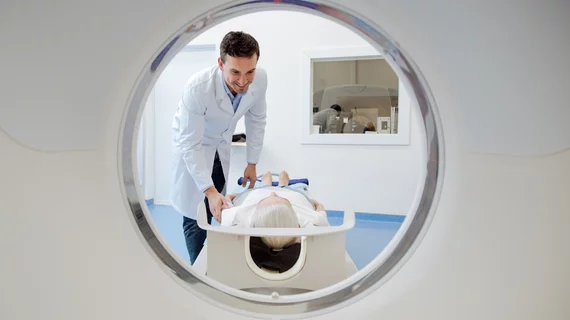MR imaging-guided SABR extends the lives of patients with inoperable pancreatic cancer
Ablative radiation therapy guided by magnetic resonance imaging “significantly” extends the lives of patients with inoperable pancreatic cancer, according to recently presented research.
Patients undergoing chemotherapy and standard radiation for this form of cancer typically live 12-15 months. But Miami Cancer Institute experts found using MR-guided stereotactic ablative radiation therapy or SABR prolonged survival, with many living 21 months.
The group first presented their findings at the European Society for Radiotherapy and Oncology (ESTRO) 2021 conference in Madrid on Aug. 29.
“We were among the first to publish MR-guided SABR results for inoperable pancreas cancer in 2019 that demonstrated encouraging early results,” Michael Chuong, MD, medical director of Radiation Oncology at the Florida institute, said Sept. 7. “Now, with longer follow- up, we are encouraged that [the] benefits of MR-guided SABR not only have been maintained over several years, but especially because they have been achieved without significant side effects in nearly all patients.”
Image-guided SABR is a noninvasive, outpatient procedure typically ordered after chemotherapy. It delivers nearly twice the radiation dose that can be safely administered over five days with traditional machines.
Chuong and colleagues tested their approach in 50 patients with inoperable, non-metastatic pancreatic adenocarcinoma treated between 2018-2020. Median follow-up was 18 months post-diagnosis but ranged from 7-39 months.
At one-year follow-up, 87.9% of patients had an estimated overall survival of 21 months. At two years, that figure dropped down to 50%.
Furthermore, median one-year and two-year estimated progression-free survival was 16 months for 67.7% and 25.7% of patients, respectively.
“We understand how devastating a diagnosis of pancreatic cancer can be for patients and their families,” Chuong added. “We are very excited that our work is advancing cancer care, possibly contributing to longer survival rates while maintaining a high quality of life for our patients. Our hope, as we conduct more trials, is that we see these targeted therapies having huge benefits to patients with many other types of cancer.”

